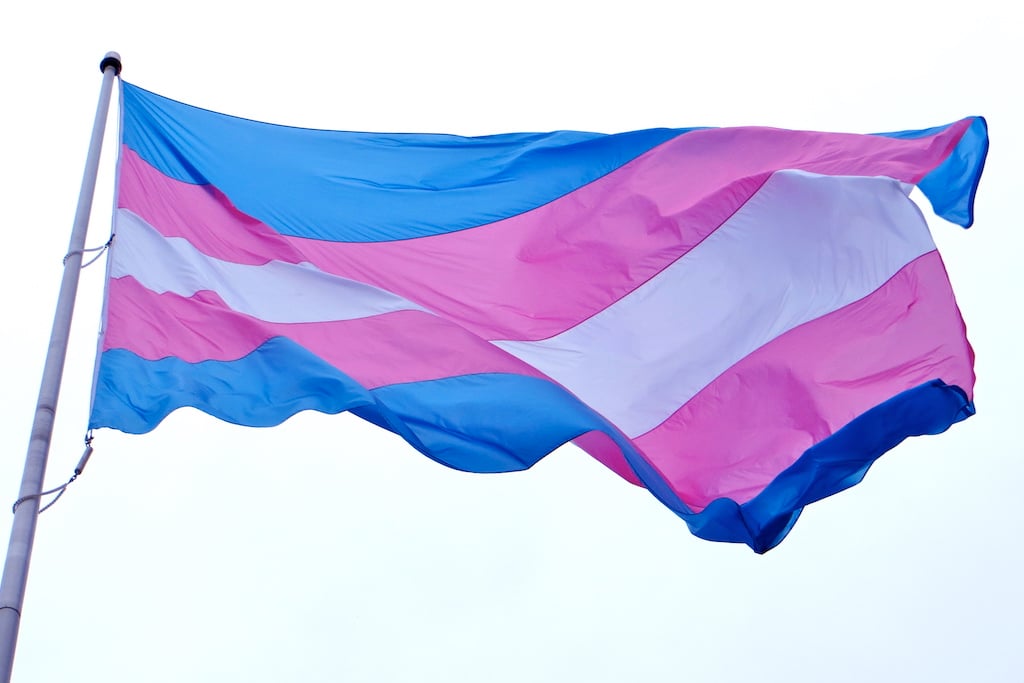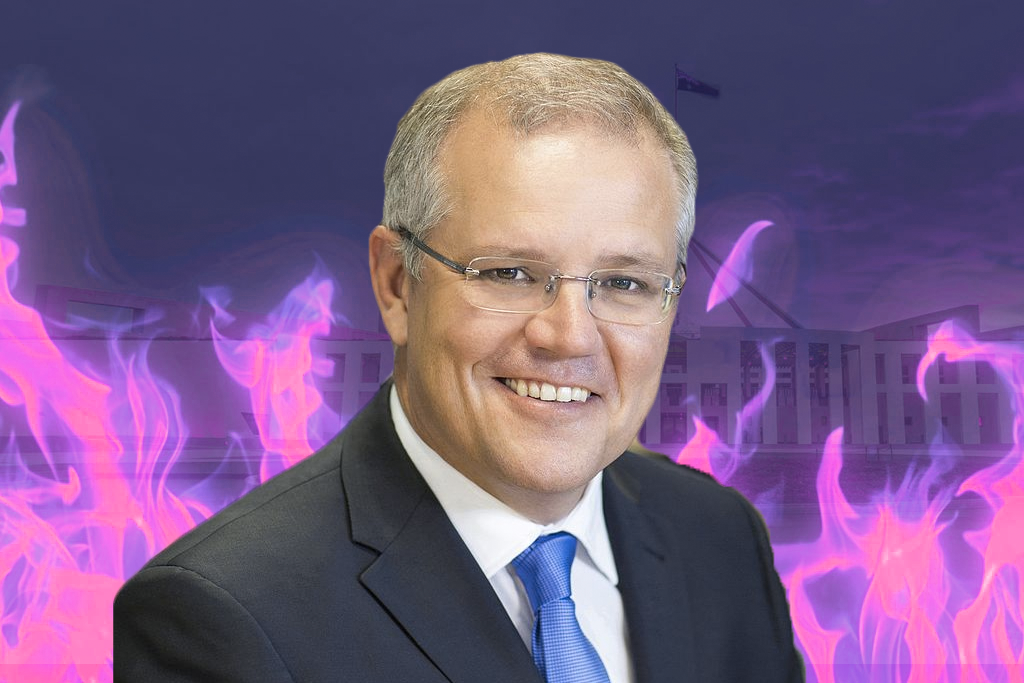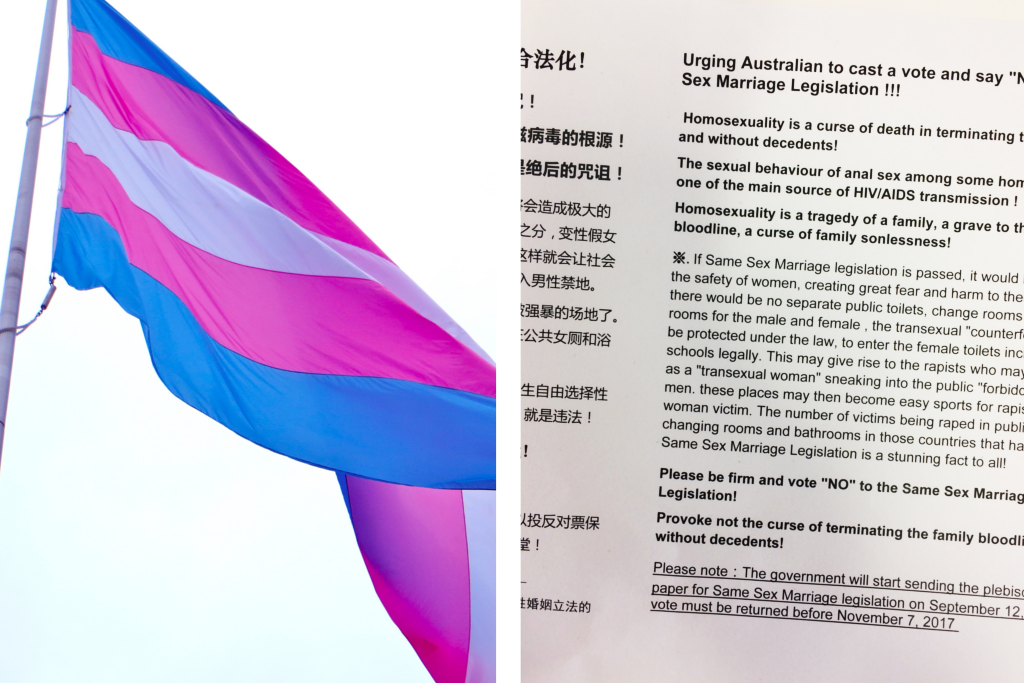We Fact-Checked The Daily Telegraph’s Rubbish About “Gender Whisperers” And Trans Kids
Spoilers: The Telegraph and the PM are wrong.
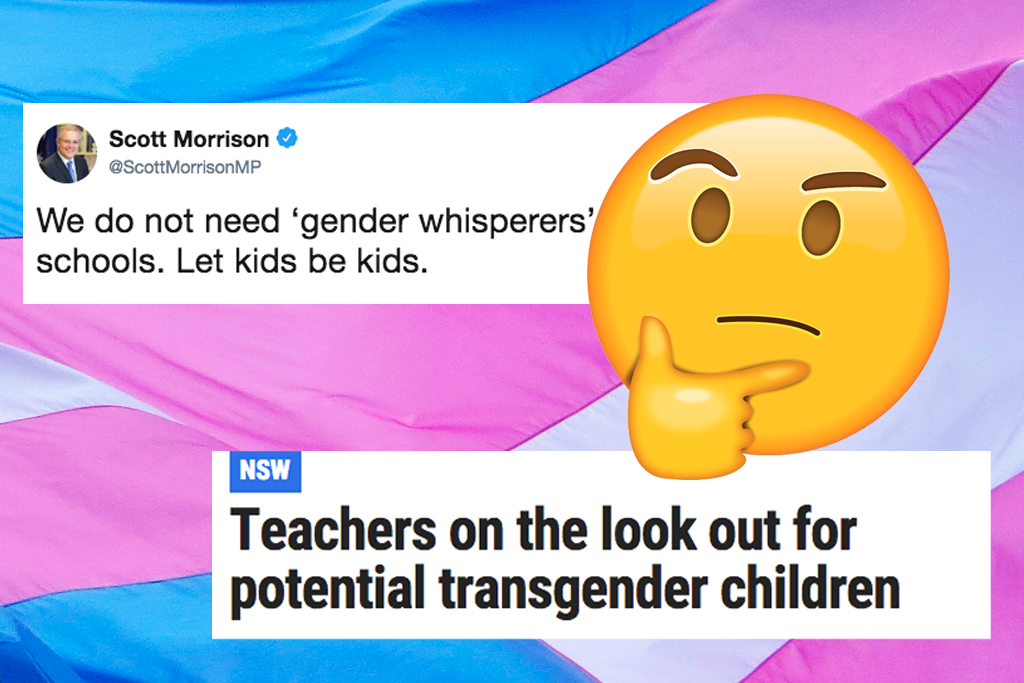
This morning, Prime Minister Scott Morrison tweeted a bizarre statement. “We do not need ‘gender whisperers’ in our schools,” he wrote. “Let kids be kids”. He then linked to an article published by the Daily Telegraph, which claims that as a result of some school teachers receiving training to help them identify and support transgender kids, there has somehow been a sudden spike in kids receiving “irreversible surgeries” and other miscellaneous harms.
Let’s not mince words: the Daily Telegraph article is utter bullshit.
We do not need ‘gender whisperers’ in our schools. Let kids be kids. https://t.co/POzM26PXU5
— Scott Morrison (@ScottMorrisonMP) September 4, 2018
It selectively quotes a single paediatrician who believes that providing support to transgender kids is harmful. It ignores, or otherwise appears to be totally unaware of, existing guidelines on providing medical care to transgender kids, which make clear that all treatment provided is proportional, sensible, and largely reversible.
As one of the story’s own sources told Junkee this morning, The Tele and the PM are “making a mountain out of a molehill”.
We’ve taken the liberty of fact-checking this very harmful article. Before you do a Scott Morrison and start panicking about “gender whisperers” in schools, here are the actual facts about what teachers are being taught, and what kind of treatment is available to trans kids.
Here’s What Teachers Are Actually Being Taught About Trans Kids
Let’s begin with Morrison’s concern about “gender whisperers” in schools. He’s actually referring to people like counsellor Dr. Elizabeth Riley, who, The Tele reported, “has advised 40 private, public and Catholic schools in the past three years”.
Riley told The Telegraph that her role is to “teach the school how to deal with these children with special needs and to treat them like any other child”. The Tele also quoted Western Sydney University Professor of Paediatrics John Whitehall, who said experts like Dr. Riley are “part of the problem as they mess with the kids by giving them a platform to believe they have a genuine problem”. Whitehall suggested that counsellors like Dr. Riley are contributing to “a sad, tragic and very dangerous fad, especially when medical treatment can involve hormones that interfere with the brain as well as the body, and progress to irreversible surgery and loss of fertility”.
Sounds scary, except that Dr. Riley’s role is actually much more mundane. Speaking to Junkee this morning, she clarified what it is that she actually does, which is teach school staff what terms like transgender actually mean, and how to recognise a child potentially in distress over their gender identity. She then offers counselling services to help get those kids the support they may need.
If a school does identify a kid who might be trans, here’s what happens: “Firstly I say you must speak to the parents, because sometimes the school recognises it and the parents haven’t said anything,” Dr. Riley said. “The parents will usually come and see me, and I’ll recommend that they go to Westmead Children’s Clinic and see a psychiatrist for a full diagnosis. And it’s only if the child is 100% [certain] and [their status is] clear that we even go down this path. Sometime it’s not even an identity, it’s just a preference or something.”
Does does anyone really think kids can be “gender whispered” into changing their gender? I have three children and this is utter bullshit. The very small proportion of community that do have huge rates of youth suicide. This is a dangerously stupid tweet. https://t.co/ZsHyB9EQJd
— Samantha Maiden (@samanthamaiden) September 5, 2018
In other words, part of her role is to rule out kids who aren’t actually trans. She meets with the kids three times before she even makes a call on whether to refer them to another doctor, and the parents are kept in the loop the entire time. And once a kid gets to, say, Westmead Children’s Clinic, the process kicks off with more of the same: “the very first thing they do is put them through quite a stringent diagnostic process, refer them to a psychiatrist and an endocrinologist,” Dr. Riley said. “It’s only after all these people agree and the parents are supportive, and the child agrees, and everyone’s on the same page — it’s only when all the dots line up that people go into their next process of intervention, if that’s appropriate.”
So while the Daily Telegraph trumpets concern about a supposed “236 percent surge in the number of kids wanting to change sex in the past three years”, Dr. Riley isn’t so worried. Sure, she’s “concerned that there are people who don’t have the knowledge that I do, that are diagnosing some children as trans who aren’t”. Sure, sometimes kids come to her “who are kind of into the ‘I want to be different’ kind of thing”. She’s not worried, because these kids are getting filtered out by the stringent diagnostic process.
Gender counsellor Dr Elizabeth Riley on NSW teachers being trained to identify potential transgender students: If the child is distressed, then we have a responsibility to reduce that distress.
MORE: https://t.co/uR9blGW1vZ #newsday pic.twitter.com/DUGXMA5q5h
— Sky News Australia (@SkyNewsAust) September 5, 2018
“If a child comes to see me, and they’re quoting off some website or some book, it doesn’t cut it. I need to hear a really clear, genuine comment from them about what gender is to them. I’ve had young people who keep coming into my office saying they want hormones, and they don’t get it. They go out all sulky. The thing is, the kids who aren’t trans don’t want to be trans.”
“The thing is, the kids who aren’t trans don’t want to be trans.”
As for the idea that kids are somehow being talked into being trans these days, Dr. Riley was frank in saying she thinks it’s nonsense.
“Any kid that’s going through this because of a contagion is not going to go through with it, they’re not going to get there,” she explained. “Medical professionals need to see that it’s a kind of distress for them, not an excitement or novelty. It has to be about the body.”
This Is What Actually Happens When A Trans Kid Seeks Help
If a kid even makes it to the next step of treatment, it’s still not that dramatic. Paediatricians at the Royal Children’s Hospital in Melbourne have actually released a document outlining recommended standards of care and treatment guidelines for transgender kids and adolescents. One look at this document seems to make it clear that the experts quoted in The Daily Telegraph are deeply misinformed about the kind of treatment transgender kids are actually receiving.
The Royal Children’s Hospital guidelines begin with a directive to medical professionals to avoid causing harm, and also to individualise care to the needs of particular children. The guidelines are also extremely clear about the forms of treatment accessible to trans children, which for the most part are nowhere near the “irreversible surgery and loss of fertility” The Daily Telegraph seems to enjoy scaremongering about.
In the case of pre-pubescent children, the guidelines recommend small and reversible steps towards transition, which should be “led by the child”. There’s no situation here where medical professionals are talking kids into stuff. The kind of treatment options recommended are things like affirming psychological support to help understand what the kid’s going through, possibly some small acts of social transition if the child wants them (trying a different name, getting a haircut, wearing different clothes etc). In short, nothing to panic about.
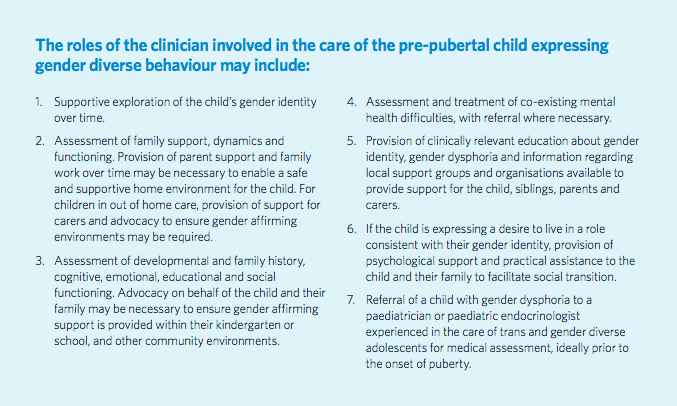
The Royal Children’s Hospital’s treatment recommendations for transgender kids.
The treatment options for adolescents, or kids who’ve reached puberty, go a step further, but they’re still pretty restrained. They include continued psychological support and counselling, advice on the safest way to go about things like chest-binding (e.g. wearing a garment to temporarily flatten breasts to give the appearance of a flat chest), fertility counselling (to advise trans kids on how further transition might affect their ability to have kids, and on their options), and puberty suppression — the use of medication to temporarily delay puberty to give the child time to decide whether and how they would like transition to proceed.
For adolescents, there is also the possibility of Stage 2 treatment, or hormone therapy, if it is in that particular child’s best interests. This stage of treatment will only proceed after serious consideration — as the Royal Children’s Hospital recommendations point out, “Adolescents vary in the age at which they become competent to make decisions that have complex risk-benefit ratios, as is the case with hormone treatment that is partially irreversible.”
“This is an important consideration, with a thorough assessment of competence being a central part of both mental health and paediatric assessments. In addition to ensuring the adolescent is competent to make an informed decision, the timing of commencement of stage 2 treatment will also depend on the nature of the history and presentation of the person’s gender dysphoria, duration of time on puberty suppression for those undertaking stage 1 treatment, co-existing mental health and
medical issues and existing family support.”
In short, a kid is only going to start hormones after they’ve had a thorough psychological evaluation and support, and after other potential causes for their gender dysphoria have been ruled out. The kid and their parents will be told about risks associated with transition, and the specific effects of hormones that are irreversible. They will likely have already spent a period of time trying out a new name and clothes, and using puberty blockers to give them extra time before they make irreversible decisions. In short, the best available medical advice is recommending that doctors and families take this process slowly, are fully informed, and progress to irreversible treatment options only once all the reversible ones have been tried. No one is being fast-tracked to irreversible surgery.
In fact, the guidelines emphasise that genital surgery on minors is incredibly rare, and recommend that any consideration of genital surgery be delayed until adulthood. As for “top surgery” (surgery to remove breasts) the guidelines state that this may be considered from age 16, but that “given the irreversible nature of gender affirming surgical procedures, the decision to undertake chest reconstructive surgery during adolescence requires considered and thorough assessment by professionals experienced in working with adolescents with gender dysphoria.” So even in the relatively rare cases where gender-affirming surgery on children is considered, it’s subject to an enormous number of checks and balances.
Again, no one is being rushed to irreversible surgery. You’re welcome to read the full Royal Children’s Hospital guidelines here and see for yourself.
Gender-Affirming Treatment For Trans Kids Is Vitally Important
In The Daily Telegraph’s article this morning, paediatrician Professor John Whitehall (you know, the guy saying experts like Dr. Riley are messing with kids) is also reported to have said children should not be allowed to undergo even Stage 1 treatment — that is, counselling and perhaps a new name and change of clothes — until they are 18. Experts on the treatment of transgender kids say this is actually an extremely dangerous approach, and the Family Court agrees.
“The Royal Children’s Hospital’s standards of care are very clear that doing nothing ‘is not considered a neutral option’.”
The Royal Children’s Hospital’s standards of care are very clear that doing nothing “is not considered a neutral option, and may exacerbate distress in a number of ways including increasing depression, anxiety and suicidality, social withdrawal, as well as possibly increasing chances of young people illegally accessing medications”. I think we can agree that all of these things are vastly more harmful to a child than allowing them to wear different clothes and use a different name.
It’s well established that transgender kids face extraordinarily high levels of depression and mental illness, and that suicide and self-harm are real risks. This is, in part, the reason that experts like Dr. Riley are educating schools in the first place — her own PhD research revealed that around 50% of trans adults recognised before the age of six that something was going on with their gender. Experts like Dr. Riley are educating schools so that young kids, and the parents of young kids, who are experiencing this have resources, information and somewhere to go, before serious harm is done.
As Dr. Riley told Junkee this morning, unlike the fearmongering Daily Telegraph, “I don’t see being trans as being a problem. That comes from a real pathologising perspective. I’m looking at an approach of ‘let’s embrace these kids’. It’s not about seeing them as kids with issues — they’ve just got special needs that need to be met.”
Unfortunately, having our Prime Minister spread ill-informed fears about “gender whisperers”, whatever they are, does not help meet those needs. If you want to “let kids be kids”, free from harm and distress, there’s one simple solution: do your research.
Sam Langford is Junkee’s Staff Writer and tweets at @_slangers.
